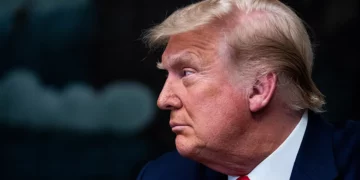| T |
he Nigerian telecommunications sector has recorded great success in recent times. One of these achievements is its contribution to the Gross Domestic Product (GDP) of Nigeria, which has significantly increased to 16 percent in the second quarter of 2023.
From a 14.13 percent contribution in the first quarter of 2023, and up from the hitherto 15 percent all-time-high record contributed in the second quarter of 2022, the telecommunications sector added 16 percent to the national GDP in the second quarter of 2023 to set a new record.
„From about eight percent contribution to GDP in 2015, when I came on board as the executive vice chairman of NCC, quarterly GDP has increased significantly to reach its current threshold of 16 percent, and that this has continued to positively impact all aspects of the economy,“ the executive vice chairman of NCC, Prof. Umar Danbatta, affirmed.
Danbatta, while delivering his keynote address at the annual Telecom Executives and Regulators Forum 2023 (TERF) hosted by the Association of Telecom Companies of Nigeria (ATCON) in Lagos, took the audience, promising executives of telecom companies and other industry stakeholders, through the giant strides being made by the Commission.
The EVC attributed the success to sustained regulatory excellence and operational efficiency by the Commission. „The industry has grown in leaps and bounds over the past two decades, and this has impacted on all other sectors of the economy. The effective regulatory regime emplaced by the NCC and with the support from all stakeholders has been our major success factor as an industry,“ Danbatta added.
With success comes new challenges.
However, stakeholders in the industry have unanimously agreed that the sector would do much better if the challenges and barriers that have marred the sector for years are addressed.
For instance, the president of ATCON, Mr. Tony Emoekpere, averred that the ICT sector is expanding quickly and is estimated to have contributed over 16 percent of the country‘s GDP, although the sector could perform substantially better if some of the problems experienced by operators were resolved.
Emoekpere listed one of such challenges as multiple taxation, of which he tasked the Commission and other stakeholders to look at ways to address it, along with other challenges.
In the same vein, the chairman of the Association of Licensed Telecoms Operators of Nigeria (ALTON), Engr. Gbenga Adebayo, said the challenges faced by the operators five years ago are still the same as today.
One of such challenges is multiple taxation, Adebayo said, adding that, „there are about 46 taxes paid by operators. We will be grateful if the taxes are reduced to about 20. We may not be able to change the status quo if we do not do things differently.“
Head, Enterprise Sales, FiberOne Broadband Limited, Mr. Kenny Joda, also talked about the challenges faced by Internet Service Providers (ISPs). According to Joda, about 90 percent out of the 568 indigenous ISPs in Nigeria are struggling due to multiple taxation, infrastructure, high cost of doing business, and forex, among others.
NCC‘s efforts in tackling challenges in ICT sector
Danbatta is not blind to these challenges, even as he stated that while there are barriers to broadband deployment in the country, ranging from the issue of the right of way (RoW), fiber cuts, high capital requirements for deployment, multiple taxations, and regulations, among other challenges, the NCC is navigating regulatory complexities, digital divide and literacy, security concerns with firmness and increased collaborations with necessary stakeholders such as ATCON to create measures towards tackling the challenges.
For instance, on the five percent excise duty on telecoms services, Danbatta said with the help of the Commission, the federal government was able to suspend the five percent excise duty, while also calling for the total exemption.
„When the federal government attempted to introduce the five percent excise duty on telecommunication services, I remember we listed 41 levies, taxes, and charges that have been forced on telecommunication companies in the country. And now, the number has gotten to 46. The immediate past president Buhari had approved the exemption of telecom from the excise duty. It, however, came as a total shock to us when the duty came up again in the Finance Act amended by the National Assembly.
„President Tinubu again suspending the excise duty is a good sign, and I assure you that we are going to continue to argue convincingly that the duty on telecommunication services should not only be suspended but telecommunication services should be exempted from excise duty because the excise duties are paid on luxury items, and telecommunication services cannot be considered as a luxury. Telecommunication services have become very much a part of our individual lives, and they affect more than 220 million Nigerians.
„The planned five percent excise duty was going to be borne by the millions of subscribers. You can imagine what would be the implication if that was implemented. Many would not be able to continue using these important services. So, we are delighted with the suspension, but we have engaged our minister to draw his attention to the need to really exempt the sector from this duty altogether,“ Danbatta explained.
Recall that indigenous banks are owing telecoms operators about N120 billion for the Unstructured Supplementary Service Data (USSD). USSD was introduced as part of efforts to ensure financial inclusion in Nigeria. The service is being provided by telecoms operators to the banks. The origin of the problem started when the banks insisted on end-user billing as opposed to corporate billing.
Danbatta explained that the banks wanted end-user billing, while insisting that it cannot work since operators are providing the service to the banks, and not to their customers.
“The banks charge their customers for the service, and they are to pay the telecoms operators in the form of corporate billing, which is neat. Then along the way, there was a misunderstanding, and the debt kept piling until it reached a humongous amount of over N100 billion. Even at that, the service was still being provided to customers by the banks using the telecom infrastructure, and the telecoms operators were not being paid. This was despite the intervention of the immediate past minister,” Danbatta explained.
Following series of meetings between NCC, telecoms operators, the banks, and the acting governor of the Central Bank of Nigeria (CBN), Folashodun Shonubi, a consensus was reached, Danbatta averred, as the banks have agreed to clear the accumulated debt and continue to pay for the USSD service going forward under the corporate billing term.
On the RoW challenge, the EVC said there are about 46 different taxes directed at the telecom sector at the moment. „Such charges and levels, coming in various names, are imposed on telecom operators by some agencies and tiers of government, especially at the state and local levels. The challenge translates into greater economic burdens on telecom subscribers in the country,“ Danbatta said.
Recall that in early 2020, the National Executive Council (NEC) reached an agreement with the 36 state governors, including the Federal Capital Territory, to have a harmonized Right of Way (ROW) charge of N145 per linear meter for fiber broadband infrastructure investment across the country in line with the National Broadband Plan.
„While some states are charging above the N145, I am glad to inform you that about three states in Nigeria have expunged the fees. We are still working with other states to think in this direction,“ the EVC assured.
Speaking on connectivity, Danbatta said, “Over the years, we have identified some clusters of access gaps all over the country, but we have recorded a significant drop in the number of access gaps, as we continue to drive initiatives that boost access to telecommunications services.“
He stated that the Commission does this by enlisting government commitment to a digital economy with robust policy frameworks, promotion of investment and funding, stimulation of infrastructure development, digital inclusion and literacy, promotion of competition and market liberalization, effective allocation of spectrum, as well as driving the e-government ecosystem.
Danbatta said with various ongoing regulatory efforts, “The NCC is confident that we are going to reach 50 percent broadband penetration threshold by the end of 2023, and by 2025, we would have met and possibly surpassed the 70 percent broadband penetration target, as contained in the Nigerian National Broadband Plan (NNBP), 2020-2025.”
The EVC particularly commended ATCON and its members for being partners in progress and for constantly engaging the Commission in constructive ways towards finding solutions to the myriad of challenges confronting the industry. The EVC said a national broadband network and a thriving digital economy are not without their challenges. “However, these challenges can be overcome through determination, innovation, and strategic planning. By focusing on the success factors and addressing the barriers, we can create a future where every Nigerian has access to the opportunities that the digital world offers,” he added.
Danbatta also stated that the success of the nation’s digital aspirations is beyond technological advancements but also about transforming lives, driving economic growth, and ensuring that a nation remains competitive on the global stage. “As we work together to navigate this path, I enjoin all our stakeholders in the public and private sectors to remain committed to building a brighter and more connected future for our country,” he said.





